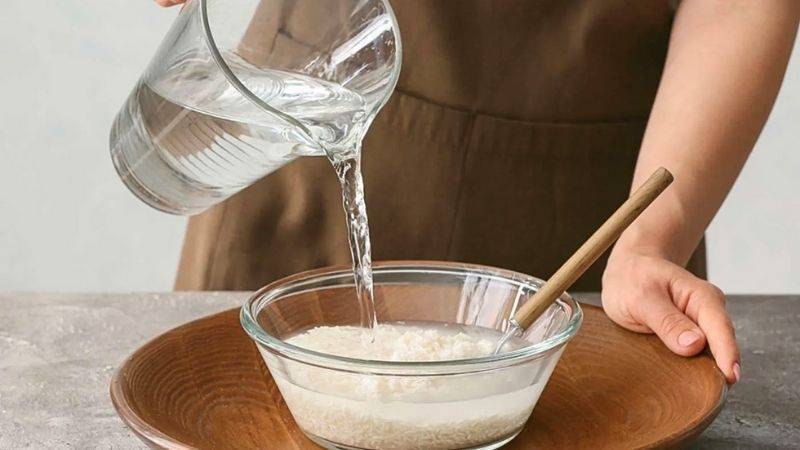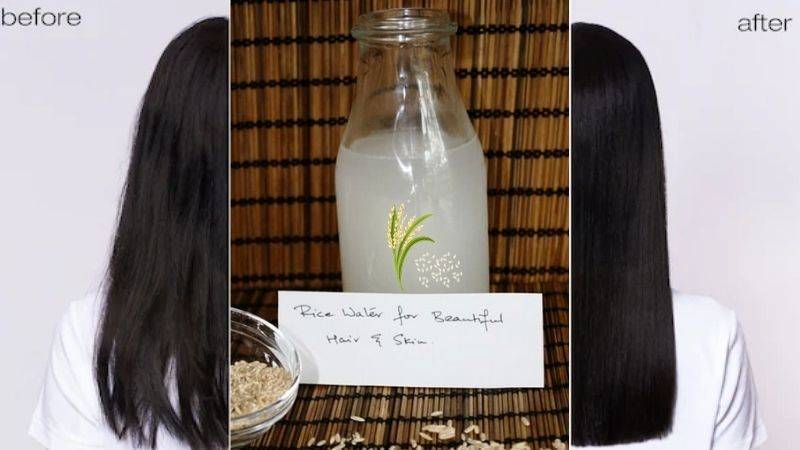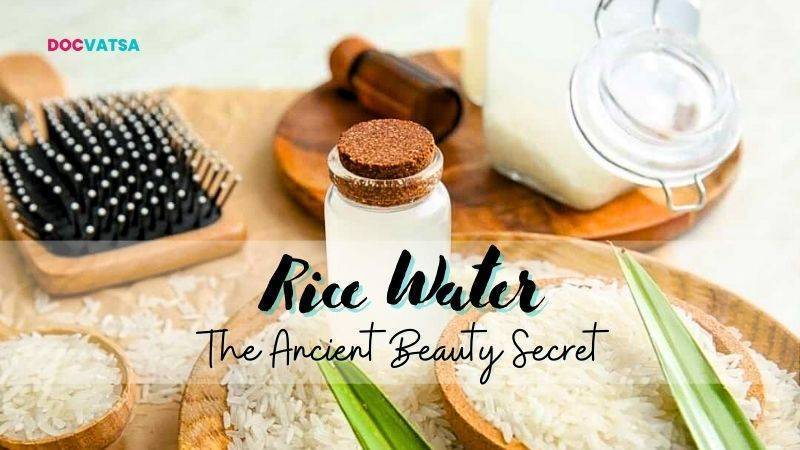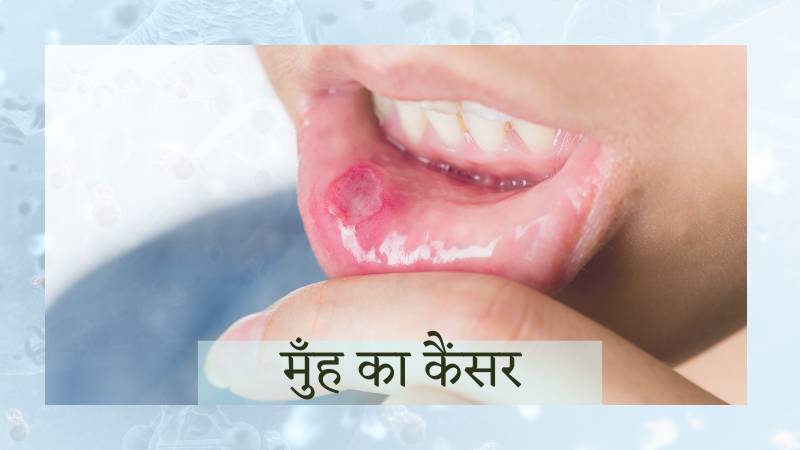“Unlock the Magic of Rice Water for Healthy, Shiny Hair!”
At a Glance
Rice water is an ancient beauty secret that has been used for centuries as a natural remedy for hair growth and health. It is a simple and inexpensive way to nourish your hair and scalp, and it can be used as a shampoo, conditioner, and even a styling product.
In this article, we will discuss the benefits of using rice water on your hair and how to make DIY hair masks at home.
Science Behind Rice Water and Hair Growth
The science behind rice water and hair growth is based on the nutrients found in the water. It contains a variety of vitamins, minerals, and amino acids that are beneficial for hair growth.
These nutrients include
- vitamins B, C, and E
- minerals such as magnesium, potassium, and zinc.
- It contains inositol, which is a carbohydrate that helps to strengthen hair follicles and promote hair growth.
- It also contains antioxidants that can help to protect the hair from damage caused by free radicals- molecules that can damage the hair and cause it to become brittle and weak.
- Antioxidants help to neutralize these free radicals and protect the hair from damage.
- The texture of rice water is also beneficial for hair growth. The water is thick and creamy, which helps to coat the hair and provides a protective barrier. This barrier helps to keep the hair hydrated and prevents it from becoming dry and brittle.
- Rice water is a natural detangler, making it easier to comb through and style the hair to reduce frizz and add shine to the hair.
- Finally, rice water can help to reduce scalp inflammation that causes hair loss and can make it difficult for new hair to grow.
How to Make Rice Water for Hair Growth

Rice water treatment is a safe and natural way to treat hair loss. It is also inexpensive, easy to make, and can be used as a rinse or a leave-in conditioner.
To make rice water
- rinse one cup of uncooked white rice in a bowl of cold water.
- Swish the rice around with your hands to remove any dirt or debris.
- Drain the water and repeat the process two more times.
- Next, add two cups of fresh water to the bowl of rinsed rice.
- Allow the mixture to sit for 30 minutes. This will allow the nutrients from the rice to be released into the water.
- After 30 minutes, strain the rice water into a clean bowl or container. The water should be a milky white color.
To use the rice water as a rinse
- simply pour it over your hair after shampooing and conditioning.
- Massage it into your scalp and let it sit for 10 minutes before rinsing it out with cool water.
To use the rice water as a leave-in conditioner
- pour it into a spray bottle
- spritz it onto your hair after showering
- Massage it into your scalp
- let it sit for 10 minutes before styling your hair as usual.
Give it a try and see the results for yourself!
For best results, use the rice water treatment twice a week. Over time, you should notice a decrease in hair loss and an increase in hair growth.
DIY Rice Water Hair Masks for Maximum Shine

To make your own rice water hair masks, here’s a step-by-step guide:
DIY Mask-1: Boiled Rice Water
- Boil one cup of white rice in two cups of water
- Once the rice is cooked, strain the water into a bowl and let it cool.
- Once cooled, apply the rice water to your hair and scalp, massaging it in for a few minutes.
- Leave the mask on for 15-20 minutes before rinsing it out with cold water.
- For an extra boost of shine, you can add a few drops of essential oils to the rice water before applying it to your hair. Lavender, rosemary, and peppermint are all great options for adding shine and promoting healthy hair growth.
DIY Mask-2: Fermented Rice Water
- Rinse 1/2 cup of uncooked rice (preferably organic) under running water to remove any dirt or impurities.
- Soak for 30 minutes to 1 hour. Swirl the rice around occasionally to release the nutrients into the water.
- Strain the rice water into a clean jar or container, separating the rice from the liquid. You can use the rice for cooking or discard it.
- Cover the jar or container with a breathable cloth or lid, allowing the rice water to ferment at room temperature for 24 to 48 hours.
The fermentation time depends on the temperature of the room; warmer temperatures will speed up the process. The rice water should have a slightly sour smell when it is ready.
- Before using the fermented rice water for your hair mask, it’s essential to dilute it with an equal amount of water. You can also add a few drops of essential oils like lavender or rosemary to improve the scent and enhance the hair benefits.
Using a rice water hair mask is an easy and affordable way to give your hair maximum shine. With regular use, you’ll be able to enjoy healthy, glossy locks that are sure to turn heads.
Fermented vs. Plain rice water
Fermented rice water and plain rice water both offer benefits for hair and skin health, but they differ in terms of their composition and the potency of their effects.

Fermented Rice Water:
- Higher Nutrient Content: Fermentation increases the nutrient content of rice water, making it richer in vitamins, minerals, and amino acids. As a result, fermented rice water can provide more nourishment for hair and skin.
- pH Balance: Fermented rice water has a pH level that is closer to the natural pH of hair and skin. This makes it more effective at maintaining the natural pH balance, which can contribute to improved overall hair and skin health.
- Increased Antioxidant Activity: Fermentation enhances the antioxidant properties of rice water, which can help protect hair and skin from oxidative stress and environmental damage.
- Natural Probiotics: Fermentation produces natural probiotics, which can promote a healthy scalp and skin microbiome, helping to keep them in optimal condition.
Plain Rice Water:
- Mild Effects: Plain rice water is less potent than fermented rice water, making it gentler on hair and skin. This may be beneficial for those with sensitive skin or hair that is prone to damage.
- Easier to Prepare: Plain rice water can be prepared more quickly than fermented rice water, as it does not require additional fermentation time.
- Less Odor: Fermented rice water can have a strong odor.






